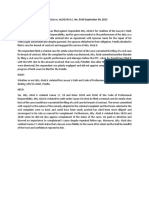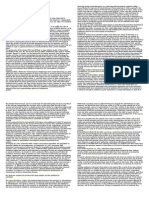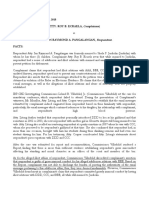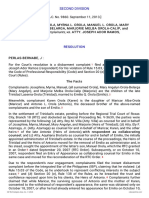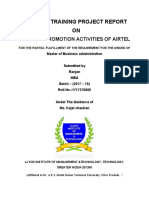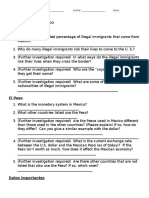Orola v. Ramos
Orola v. Ramos
Uploaded by
CamCopyright:
Available Formats
Orola v. Ramos
Orola v. Ramos
Uploaded by
CamOriginal Description:
Copyright
Available Formats
Share this document
Did you find this document useful?
Is this content inappropriate?
Copyright:
Available Formats
Orola v. Ramos
Orola v. Ramos
Uploaded by
CamCopyright:
Available Formats
Josephine L. Orola, et al v. Atty.
Joseph Ador Ramos
AC No. 9860, September 11, 2013
Facts:
This involves the settlement of the estate of Trinidad Laserna-Orola. She was
married to Emilio Q. Orola who has the appointed administrator. Some
of the complainants are their children who are named Josephine,
Myrna, Manueal, Mary Angelyn, Marjorie, and Antonio. Antonio, who is
already deceased, is married to Maricar and has a daughter named
Karen, who is also a complainant in this case.
In the settlement of Trinidad’s estate, Maricar and Karen were represented by
Atty. Azarraga, Jr. with Atty. Ramos, the respondent, as collaborating
counsel.
In the course of the proceedings, the heirs of Trinidad and Heirs of Antonio
(Maricar and Karen) moved for the removal of Emilio as administrator
and, in his stead, sought the appointment of the latter’s son, Manual.
The RTC granted the petition in September 20 2007.
Atty. Ramos then asked Maricar and Karen to withdraw as their counsel.
Karen consented to the withdrawal of respondent’s appearance only on
October 18, 2007. However, respondent filed an Entry of Appearance
as collaborating counsel for Emilio on October 10, 2007.
Due to the respondent’s new engagement, complainants filed th einstant
disbarment complaint against respondent before the IBP claiming that
he violated Rule 15.03 of the Code, as he undertook to represent
conflicting interests in the subject case; and Section 20(e), Rule 138 of
the Rules, as he breached the trust and confidence reposed upon him
by his clients, the Heirs of Antonio.
In his defense, respondent contends that he never appeared as counsel for
the Heirs of Trinidad or for the Heirs of Antonio since the counsel of
the Heirs of Antonio was Atty. Azzaraga, Jr. He averred that he only
accommodated Maricar’s request to temporarily appear on her behalf
as their counsel of record could not attend the scheduled hearings and
that his appearance thereat were free of charge. He also claimed that
he obtained Maricar’s permission for him to withdraw from the case as
no further communications transpired after the two hearings he
appeared for. He then clarified that his representation for Emilio in the
subject case was more of a mediator, rather than a litigator, and that
since no settlement was forged between the parties, he formally
withdrew his appearance on December 6, 2007.
In the Report and Recommendation, the IBP found respondent was found
guilty of representing conflicting interests only with respect to Karen as
the records of the case show that he never acted as counsel for the
other complainants.
Issue:
1. Whether Atty. Ramos is guilty of representing conflicting
interests in violation of Rule 15.03 of the Code
Ruling:
1. Yes, Atty. Ramos is guilty of violating Rule 15.03 of the
Code of Professional Responsibility.
Rule 15.03 of the Code provides that a lawyer shall not
represent conflicting interests except by written consent of all
concerned given after a full disclosure of the facts.
Under this rules, it is explicit that a lawyer is prohibited from
representing new clients who interests oppose those of a
former client in any manner, whether or not they are parties
in same action or on totally unrelated cases. The prohibition is
founded on the principles of public policy and good taste. It
behooves lawyers not only to keep inviolate the client's
confidence, but also to avoid the appearance of treachery and
double-dealing for only then can litigants be encouraged to
entrust their secrets to their lawyers, which is of paramount
importance in the administration of justice.
In Hornilla v. Salunat, the Court explained the concept of
conflict of interest. The Court said that there is conflict of
interest when “a lawyer represents inconsistent interests of
two or more opposing parties. The test is “whether or not in
behalf of one client, it is the lawyer's duty to fight for an issue
or claim, but it is his duty to oppose it for the other client.” It
further explains that there is also conflict of interest if, “the
acceptance of the new retainer will require the attorney to
perform an act which will injuriously affect his first client in
any matter in which he represents him and also whether he
will be called upon in his new relation to use against his first
client any knowledge acquired through their connection.
Another test of the inconsistency of interests is whether the
acceptance of a new relation will prevent an attorney from the
full discharge of his duty of undivided fidelity and loyalty to his
client or invite suspicion of unfaithfulness or double dealing in
the performance thereof.
In this case, the Court with the IBP’s findings that respondent
conflicting interests and, perforce, must be held
administratively liable. The records reveal that respondent was
the collaborating counsel not only for Maricar as claimed by
him, but for all the Heirs of Antonio in Special Proceeding No.
V-3639. In the course thereof, the Heirs of Trinidad and the
Heirs of Antonio succeeded in removing Emilio as
administrator for having committed acts prejudicial to their
interests. Hence, when respondent proceeded to represent
Emilio for the purpose of seeking his reinstatement as
administrator in the same case, he clearly worked against the
very interest of the Heirs of Antonio – particularly, Karen – in
violation of the above-stated rule.
Respondent's justification that no confidential information was
relayed to him cannot fully exculpate him for the charges
against him since the rule on conflict of interests, as
enunciated in Hornilla, provides an absolute prohibition from
representation with respect to opposing parties in the same
case. In other words, a lawyer cannot change his
representation from one party to the latter’s opponent in the
same case. That respondent’s previous appearances for and in
behalf of the Heirs of Antonio was only a friendly
accommodation cannot equally be given any credence since
the aforesaid rule holds even if the inconsistency is remote or
merely probable or even if the lawyer has acted in good faith
and with no intention to represent conflicting interests.
Additionally, even on the assertion that he was only engaging
with Emilio as a mediator, rather than a litigator, his conduct
is likewise improper since Rule 15.04 of the Canon 15 of the
Code similarly requires the lawyer to obtain the written
consent of all concerned before he may act as mediator,
conciliator or arbitrator in settling disputes. Irrefragably,
respondent failed in this respect as the records show that
respondent was remiss in his duty to make a full disclosure of
his impending engagement as Emilio’s counsel to all the Heirs
of Antonio – particularly, Karen – and equally secure their
express written consent before consummating the same.
The Court suspended Atty. Ramos for a period of 3 months and gave a
warning that a repetition of the same or similar acts in the future will
be dealt with more severely.
You might also like
- Orola V RamosDocument2 pagesOrola V RamosMasterboleroNo ratings yet
- Department Order No. 2012-10Document13 pagesDepartment Order No. 2012-10Cam0% (1)
- Leg WRT ReportDocument22 pagesLeg WRT ReportFarica Arradaza ZgamboNo ratings yet
- CSC Resolution No 020709Document4 pagesCSC Resolution No 020709CamNo ratings yet
- The Grand AfroportDocument6 pagesThe Grand AfroportNetoNo ratings yet
- SAP S4 HANA Vs ECCDocument25 pagesSAP S4 HANA Vs ECCDeepak Gupta100% (10)
- 1) Flordeliza Madria vs. Atty. Carlos RiveraDocument54 pages1) Flordeliza Madria vs. Atty. Carlos RiveraMasterboleroNo ratings yet
- PCGG vs. Sandiganbayan, G.R. No. 151805 (2005) - Philippines Case DigestsDocument2 pagesPCGG vs. Sandiganbayan, G.R. No. 151805 (2005) - Philippines Case DigestsMaddison YuNo ratings yet
- Maceda CaseDocument7 pagesMaceda CaseDANICA FLORES100% (1)
- In Re Argosinio, 270 SCRA 26Document1 pageIn Re Argosinio, 270 SCRA 26Andrei Da JoseNo ratings yet
- PALE NotesDocument8 pagesPALE NotesCarmel Grace KiwasNo ratings yet
- Chapter 12 LegWritDocument2 pagesChapter 12 LegWritValerie San MiguelNo ratings yet
- Tria-Samonte V Obias (2013)Document2 pagesTria-Samonte V Obias (2013)katrina_petillaNo ratings yet
- Penilla vs. Alcid JR A.C. No. 9149 September 04, 2013Document1 pagePenilla vs. Alcid JR A.C. No. 9149 September 04, 2013Markus Tran MoraldeNo ratings yet
- 12 Trovela vs. RoblesDocument7 pages12 Trovela vs. RoblesAwin LandichoNo ratings yet
- Occena vs. MarquezDocument4 pagesOccena vs. MarquezGodofredo Ponteras IIINo ratings yet
- Case Digest 2Document21 pagesCase Digest 2Tom HerreraNo ratings yet
- Complete Legal Ethics Reviewer Canon 1 22Document59 pagesComplete Legal Ethics Reviewer Canon 1 22GCan02No ratings yet
- Aguirre vs. Rana (B. M. No. 1036 - June 10, 2003)Document2 pagesAguirre vs. Rana (B. M. No. 1036 - June 10, 2003)Lecdiee Nhojiezz Tacissea SalnackyiNo ratings yet
- In Re: Cunanan Resolution Cunanan, Et. Al 18 March 1954 FactsDocument5 pagesIn Re: Cunanan Resolution Cunanan, Et. Al 18 March 1954 FactsjamNo ratings yet
- DocxDocument2 pagesDocxClauds GadzzNo ratings yet
- Ali Vs Bubong Digest EaDocument2 pagesAli Vs Bubong Digest EaAndrea Elizze ManuelNo ratings yet
- Digest Pa MoreDocument9 pagesDigest Pa Morelou navarroNo ratings yet
- Director of Religious Affairs vs. BayotDocument1 pageDirector of Religious Affairs vs. BayotHann Faye BabaelNo ratings yet
- JC FinaleDocument2 pagesJC FinaleJem Cromwell S. GorospeNo ratings yet
- Class Advisory No. 8 (02 May 2021)Document2 pagesClass Advisory No. 8 (02 May 2021)Karl Lorenzo BabianoNo ratings yet
- SEC 15.01 - Calme V CA, GR No. 116688, 261 SCRA 285 PDFDocument7 pagesSEC 15.01 - Calme V CA, GR No. 116688, 261 SCRA 285 PDFabo8008No ratings yet
- Case Digest de Guzman V. de DiosA.C. No. 4943. January 26, 2001Document2 pagesCase Digest de Guzman V. de DiosA.C. No. 4943. January 26, 2001Daniel Dela CruzNo ratings yet
- A.C. No. 6591 May 4, 2005 MARISSA L. MACARILAY, Complainant, FELIX B. SERIÑA, RespondentDocument5 pagesA.C. No. 6591 May 4, 2005 MARISSA L. MACARILAY, Complainant, FELIX B. SERIÑA, RespondentandangNo ratings yet
- Ricafort V Medina A.C. No. 5179Document1 pageRicafort V Medina A.C. No. 5179Crystal Kate AgotNo ratings yet
- Hernandez v. GoDocument4 pagesHernandez v. GoPatch MagtanongNo ratings yet
- Crimpro Cases 1Document35 pagesCrimpro Cases 1Kim Angelie TapicNo ratings yet
- Violation of The Code of Professional ResponsibilityDocument79 pagesViolation of The Code of Professional ResponsibilityJan Aguilar EstefaniNo ratings yet
- Reodica vs. CADocument14 pagesReodica vs. CAShiela BrownNo ratings yet
- PEOPLE v. MANUEL MACAL Y BOLASCO PDFDocument2 pagesPEOPLE v. MANUEL MACAL Y BOLASCO PDFCandelaria QuezonNo ratings yet
- Hegna v. Paderanga - A.C. No. 5955, 9-8-09 - SAMARITADocument2 pagesHegna v. Paderanga - A.C. No. 5955, 9-8-09 - SAMARITAEvander ArcenalNo ratings yet
- NERA V GARCIA To CELESTIAL NICKEL V MACROASIA (Digest)Document7 pagesNERA V GARCIA To CELESTIAL NICKEL V MACROASIA (Digest)Jude ChicanoNo ratings yet
- Torts Damages Prelim SY2021 22Document2 pagesTorts Damages Prelim SY2021 22Angelie Abang100% (2)
- Avelino Vs PalanaDocument2 pagesAvelino Vs PalanaWuwu WuswewuNo ratings yet
- Lee v. SimandoDocument2 pagesLee v. SimandoAnselmo Rodiel IVNo ratings yet
- People Vs IntingDocument6 pagesPeople Vs IntingJessamine OrioqueNo ratings yet
- Case 15 - Re Proceedings For Disciplinary Action Against Atty. Vicente Raul Almacen (Pia Angelica Diaz)Document1 pageCase 15 - Re Proceedings For Disciplinary Action Against Atty. Vicente Raul Almacen (Pia Angelica Diaz)Joycee ArmilloNo ratings yet
- Roberto Cruz v. Court of AppealsDocument1 pageRoberto Cruz v. Court of AppealsGSSNo ratings yet
- Ecraela v. PangalanganDocument2 pagesEcraela v. PangalanganjrvyeeNo ratings yet
- Dalupan vs. Gacott A.C. No. 5067 Jun 29 2015 Acceptance FeesDocument5 pagesDalupan vs. Gacott A.C. No. 5067 Jun 29 2015 Acceptance FeesEppie SeverinoNo ratings yet
- SANIDAD v. AGUASDocument2 pagesSANIDAD v. AGUASMarinette OndaNo ratings yet
- Aguirre Vs Rana, B.M. No. 1036Document4 pagesAguirre Vs Rana, B.M. No. 1036Em Asiddao-DeonaNo ratings yet
- Tan Chun Suy vs. CaDocument10 pagesTan Chun Suy vs. CaIrene Leah C. RomeroNo ratings yet
- ATTY Catalan vs. SilvosaDocument1 pageATTY Catalan vs. SilvosaRogie ApoloNo ratings yet
- A.C 6732 DigestDocument2 pagesA.C 6732 DigestAnn-joEstoqueNo ratings yet
- in Re Petition TorresDocument3 pagesin Re Petition TorresJayNo ratings yet
- LBP v. Pamintuan (Pale)Document1 pageLBP v. Pamintuan (Pale)MhareyNo ratings yet
- Legal Ethics 2023 2024. Assignment 1Document1 pageLegal Ethics 2023 2024. Assignment 1Netanya Gwyneth CatubuanNo ratings yet
- Petition To Re-Acquire The Privilege To Practice Law of MunesesDocument3 pagesPetition To Re-Acquire The Privilege To Practice Law of MunesesMarione Mae Bernadette ThiamNo ratings yet
- Patricia I. Tiongson, Et Al. V. National Housing Authority 558 SCRA 56 (2008), SECOND DIVISION, (Carpio Morales, J.)Document1 pagePatricia I. Tiongson, Et Al. V. National Housing Authority 558 SCRA 56 (2008), SECOND DIVISION, (Carpio Morales, J.)Robbie James YparraguirreNo ratings yet
- Cueto V JimenezDocument1 pageCueto V JimenezClark Vincent PonlaNo ratings yet
- Frias v. Bautista LozadaDocument1 pageFrias v. Bautista LozadaCistron ExonNo ratings yet
- A.C. No. 5829 October 28, 2003 - DANIEL LEMOINE v. AMADEO E. BALON, JR. - October 2003 - Philipppine Supreme Court DecisionsDocument25 pagesA.C. No. 5829 October 28, 2003 - DANIEL LEMOINE v. AMADEO E. BALON, JR. - October 2003 - Philipppine Supreme Court DecisionsJoses Nino AguilarNo ratings yet
- Nucuum v. CabalanDocument2 pagesNucuum v. CabalanProreoNo ratings yet
- US vs. Lim, 36 Phil. 682Document10 pagesUS vs. Lim, 36 Phil. 682racel joyce gemotoNo ratings yet
- Presbitero vs. Atty SolidumDocument2 pagesPresbitero vs. Atty SolidumJzy DSNo ratings yet
- Case Digest #4Document2 pagesCase Digest #4Leopoldo, Jr. BlancoNo ratings yet
- Pale Case DigestDocument6 pagesPale Case DigestPaul Arman MurilloNo ratings yet
- Complainants Vs Vs Respondent: Second DivisionDocument6 pagesComplainants Vs Vs Respondent: Second DivisionJoaquin Niccolo FernandezNo ratings yet
- Tan V AlvaricoDocument3 pagesTan V AlvaricoCam100% (1)
- Barredo V CADocument1 pageBarredo V CACamNo ratings yet
- Ramos V ImbangDocument3 pagesRamos V ImbangCamNo ratings yet
- Divinagracia V Consolidated BroadcastingDocument2 pagesDivinagracia V Consolidated BroadcastingCamNo ratings yet
- Saa V VenidaDocument2 pagesSaa V VenidaCamNo ratings yet
- Barrios V MartinezDocument3 pagesBarrios V MartinezCamNo ratings yet
- Republic of The Philippines Civil Service CommissionDocument6 pagesRepublic of The Philippines Civil Service CommissionCamNo ratings yet
- Research Just CompensationDocument4 pagesResearch Just CompensationCamNo ratings yet
- Resolution Approving and Adopting The Policy On Contract of Service and Job WorkersDocument3 pagesResolution Approving and Adopting The Policy On Contract of Service and Job WorkersCamNo ratings yet
- Double Compensation ResearchDocument3 pagesDouble Compensation ResearchCamNo ratings yet
- Internship Report (IIP)Document53 pagesInternship Report (IIP)Mehtab AlamNo ratings yet
- DISH Further Reply To SpaceX ESIM Use 6-13-22Document6 pagesDISH Further Reply To SpaceX ESIM Use 6-13-22michaelkan1No ratings yet
- MinterEllison Early Careers 2024Document36 pagesMinterEllison Early Careers 2024shaaxoNo ratings yet
- A Presentation On Disciplinary ActionDocument24 pagesA Presentation On Disciplinary ActionAhel Patrick VitsuNo ratings yet
- PHIL105 Cheat Sheet 8104Document5 pagesPHIL105 Cheat Sheet 8104Iman SanjayaNo ratings yet
- Business - Government Objectives and PoliciesDocument2 pagesBusiness - Government Objectives and PoliciesRohaan ZeeshaanNo ratings yet
- AgreementDocument14 pagesAgreementMuhammad AnwarNo ratings yet
- Adviser Alert - Ifrs Viewpoint - Accounting For Cryptocurrencies The Basics ProtectedDocument13 pagesAdviser Alert - Ifrs Viewpoint - Accounting For Cryptocurrencies The Basics ProtectedĒuobédà RîyàdhNo ratings yet
- Lopez Vs de Los Reyes G.R. No. L 34361 - 1Document14 pagesLopez Vs de Los Reyes G.R. No. L 34361 - 1Glenn Dale LimosneroNo ratings yet
- Spiral DynamicsDocument15 pagesSpiral DynamicsVisual Editors100% (4)
- M.A. Degree Assignment - 2018 Part Ii - Final Branch: English Paper I: Drama From The 16 Century To THE 20 CenturyDocument10 pagesM.A. Degree Assignment - 2018 Part Ii - Final Branch: English Paper I: Drama From The 16 Century To THE 20 CenturykavithaNo ratings yet
- Mahri Poetry ArchiveDocument42 pagesMahri Poetry ArchiveAbdullahNo ratings yet
- In Human Resource Management, POSNER, RANDOLPH, Y WORTMAN, 1975Document6 pagesIn Human Resource Management, POSNER, RANDOLPH, Y WORTMAN, 1975Paulina PicoNo ratings yet
- The CityDocument2 pagesThe Cityasma.ouardaniNo ratings yet
- People of The Philippines and Alynn Dy vs. CADocument9 pagesPeople of The Philippines and Alynn Dy vs. CAcaa05 caaNo ratings yet
- Fly Car 5Document3 pagesFly Car 5HarshaVardhan RNo ratings yet
- Front-Page News - Newspapers and Their Role in The Agenda-SettingDocument167 pagesFront-Page News - Newspapers and Their Role in The Agenda-Settinglephuongnga2005thNo ratings yet
- Study of Promotion Activities of Airtel Payments Bank Marketing - 2018Document86 pagesStudy of Promotion Activities of Airtel Payments Bank Marketing - 2018Alok kumarNo ratings yet
- Ktda Kenya Tea Development Agency (MS) Limited: Provision of Legal ServicesDocument4 pagesKtda Kenya Tea Development Agency (MS) Limited: Provision of Legal ServicesEMMANUELNo ratings yet
- 6... Moment in High SchoolDocument3 pages6... Moment in High SchoolMisic MaximNo ratings yet
- Digest 6Document5 pagesDigest 6xx_stripped52No ratings yet
- Annual Report 2023-24Document118 pagesAnnual Report 2023-24aryankhairnar105No ratings yet
- Sericulture ReportDocument47 pagesSericulture ReportNaveen Kamat100% (1)
- Worksheet Country Focus MexicoDocument6 pagesWorksheet Country Focus Mexicoapi-288469731No ratings yet
- Srishti BIBLOGRAPHYDocument5 pagesSrishti BIBLOGRAPHYramanNo ratings yet
- Religious Experience & TraditionDocument204 pagesReligious Experience & TraditionBerel Dov LernerNo ratings yet
- Foreclosure Fraud Fighters Motion To Disqualify CounselDocument10 pagesForeclosure Fraud Fighters Motion To Disqualify CounselForeclosure Fraud80% (5)
- Numericals On National Income Value Added MethodDocument3 pagesNumericals On National Income Value Added Methodpahel38443No ratings yet













